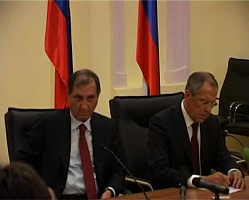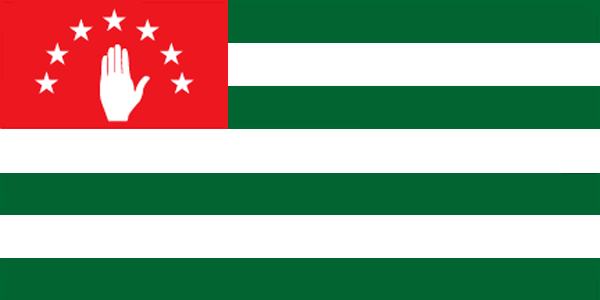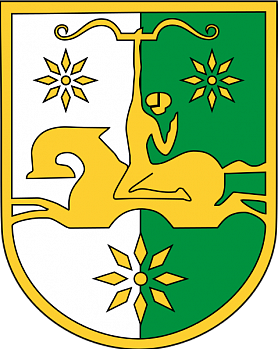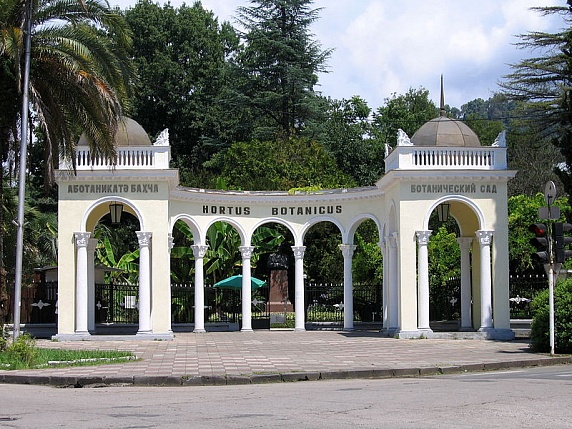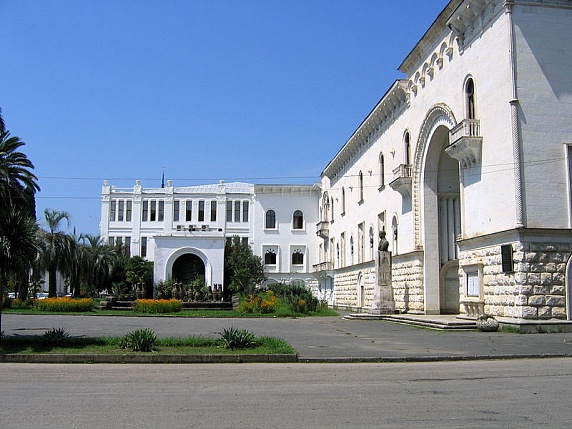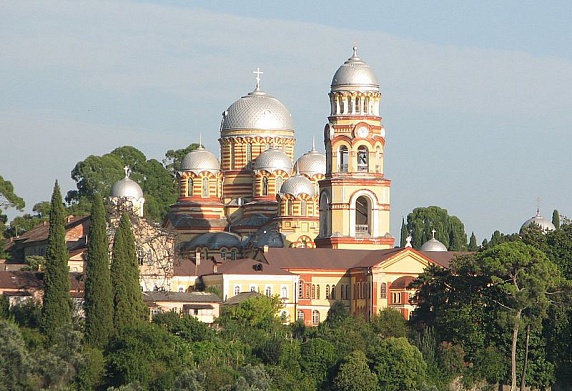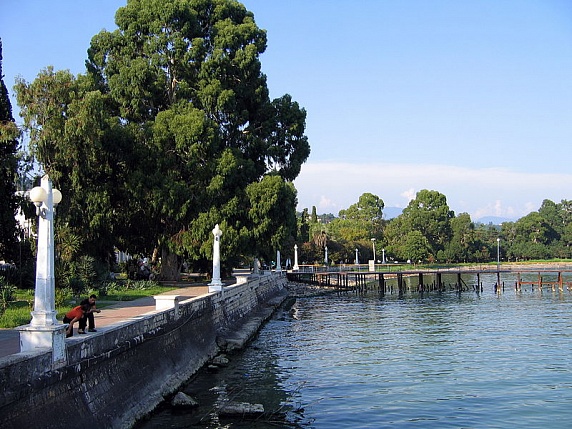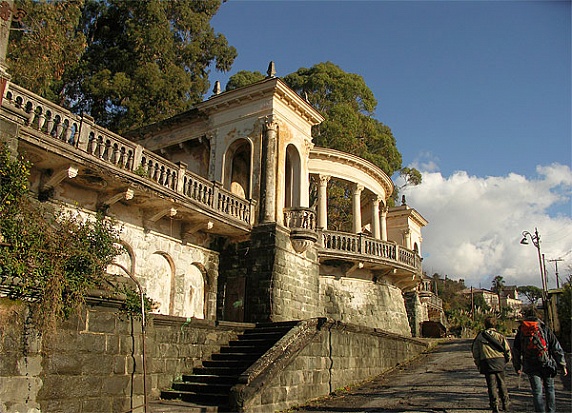 Die Republik Abchasien
Die Republik Abchasien
Transcript of Remarks and Replies to Questions by Russian Minister of Foreign Affairs Sergey Lavrov at a Meeting with the Faculty and Students of the Abkhazian State University and Members of the Public of Abkhazia, Sukhum, October 2, 2009
Just a little over a year has elapsed since the Russian Federation recognized the independence of the Republic of Abkhazia and the Republic of South Ossetia. Historically not much of a length of time, but sufficient to make a first assessment of how the now fully independent Abkhazia is developing, how relations between Russia and your state are being built and what are your achievements and the challenges that must be addressed.
It is, I think, no exaggeration to say that over this year bilateral relations have reached a fundamentally different, the interstate level of development. Relations are developing on the basis of universally recognized principles of mutual respect, cooperation, mutual benefit, and reciprocal acknowledgement and promotion of the national interests of each side. These relations are underlain by the Treaty of Friendship, Cooperation and Mutual Assistance between Russia and Abkhazia, signed in Moscow at summit level, which provides almost every conceivable form of collaboration, including assistance to each other, particularly military, in case someone again dares to encroach upon the sovereignty and independence of either Russia or the Republic of Abkhazia.
This treaty has offered the basis for numerous agreements on military cooperation, on cooperation to protect the border of the Republic of Abkhazia, and others. A number of them have already been signed, others are being prepared. The signing of another important document, the Agreement on visa-free travel between the citizens of Russia and Abkhazia, will take place today. I think that this will significantly simplify our communication, not only at the level of business, cultural exchanges, but also on a purely human level, at the level of kinship and friendly relations.
Today we are talking about the fact that security in Abkhazia is a very pressing question. Attempts at revenge, attempts to outplay the reality that some people still refuse to acknowledge, remain afoot. For all the importance of other issues, a priority is to reinforce our security alliance. Without heightened attention to security matters, there is little that can be guaranteed. That is why Russian border guards together with the Abkhaz vigilantly see to it that no violations of the state border of Abkhazia occur. That is why, at the request of the Abkhaz leadership, the Russian military helps ensure the security of your homeland. That is why we must think about how we should proceed to avoid the illusion that all is already well. Unfortunately, all is still far from well.
Attempts to provoke us with you are continuing, although they are now significantly fewer. Especially, they decreased dramatically after everyone understood that the Russian Federation's decision to recognize the independence of South Ossetia and Abkhazia is irreversible. Supporters of an "outplaying" of history are becoming increasingly fewer.
The report of the EU's commission led by Heidi Tagliavini was published a few days ago. As a result we have before us an objective document that unequivocally states what has long been known to all impartial observers, namely that the war was unleashed by the Saakashvili regime, and that the Russian Federation responded in full accordance with international law, the UN Charter and the right to self-defense laid down by it.
Surely the report was commissioned by the EU, which is made up of different states. The Cold War inertia, along with various phobias, is still strong in some of them. But all this is temporary, although at this stage it got reflected in the divergent assessments contained in the Tagliavini report, especially in the statement that the Russian Federation's response to the attack on South Ossetia and on its peacekeepers was disproportionate. Of what proportion can there be any talk when all the Russian army did consisted only in neutralizing those points in the territory of Georgia that were being used to shell Tskhinval, and the peaceful villages in South Ossetia? Of course, we all know that after South Ossetia, the same fate was in store for Abkhazia. This is convincingly evidenced by the documents that were found in the Kodori Valley, the documents of the General Staff. The fact that the security services and the leadership of Abkhazia cooperated with the Russian Federation and were able to prevent a new crime in time, was a huge achievement for all of us, and this enabled saving many human lives.
The scenario that played out over a year ago was neither the choice of Abkhazia, nor the choice of the Russian Federation. Throughout the years that followed 1993 (when a terrible war for the Abkhaz people came to an end, that had been initiated by the desire of the then Georgian regime to drive Abkhazia by force into the fold of a Georgian state that broke away from the Soviet Union and forbade the peoples of Abkhazia and South Ossetia to decide, in accordance with the then existing laws, their own future, whether to remain in the USSR or not) both Abkhazia and Russia, as the mediating state in the peaceful settlement, made every effort to negotiate peacefully and diplomatically in order to find a political solution.
Working in 1993as Deputy Minister of Foreign Affairs, I participated in the negotiations that culminated in the signing of the cease-fire agreement between Vladislav Ardzinba and Eduard Shevardnadze in the presence of the President of Russia, Boris Yeltsin. Later, already working at the UN, I participated in shaping the mandate for the UN Observer Mission in Georgia, which until recently interacted normally with the Abkhaz representatives. An extension of the mandate did not happen solely because our western partners, under pressure from Tbilisi, wanted to load it with provisions that had no relation to the practical solution of the tasks on the ground. They wanted to write down in a UN Security Council resolution that Abkhazia was still part of Georgia. Naturally, neither Abkhazia nor Russia could agree to this. Therefore, the goodwill of Sukhum and Moscow, which consisted in our readiness to support continuation of the UN observers' work, encountered purely ideological approaches prompted by geopolitical considerations, not by an interest in stabilizing life and ensuring that all was quiet on the border of Georgia and Abkhazia.
I also want to say that our Abkhaz partners had all those years prior to the recent August event of 2008 sincerely tried to negotiate with Georgia. There was even a time when, it seems, in 1998 Abkhazia entered into an agreement to consider concluding a treaty on a joint state with Georgia and was ready to do so. Tbilisi tore up the agreement; even that was not enough for it.
So all our attempts to achieve at least some kind of coexistence of Abkhazia within the fold of an entity with the Georgian side were motivated by good faith, but always came up against the excessive ultimatum-like demands of the current and previous regimes in Georgia.
Nevertheless, I am not a pessimist. What happened will never change: Abkhazia is and will remain independent. But, of course, it is in the interest of both Abkhazia and Russia to seek to ensure that the situation in the region returns to normal and that the wise Georgian people in the next democratic election come to a decision that would help bring sane persons to power in Georgia who will care about the fate of their people and about how to build good-neighborly relations with the adjacent countries. I am sure that day will come and it will be a very important event for the whole of the Caucasus, including Abkhazia, and for Russia. Here we have plenty of goodwill. What's needed is for the Georgian side to come to terms with the new realities and to grasp the necessity of building relations with its neighbors in a human manner.
I want to say a few words about the current stage of our relationship and about some practical matters. I have already noted that more than 40 documents are being worked out in addition to the dozen already signed, which will help strengthen our cooperation, the sovereignty of Abkhazia and its positions in the international arena. It is equally important that they will enable resolving the practical everyday matters of concern to each of you. Most recently an agreement was reached for Abkhazia to be transferred from Georgia's telephone codes to those of the Russian Federation. This will help avoid any problems using telephones, both fixed and mobile. We will continue to work with international organizations for Abkhazia to get its own international code, as befits an independent state.
We are developing relations in the humanitarian and cultural areas. Recently an agreement was reached with the backing of Russia's Vnesheconombank to conduct a charity event, whereby to allocate 21.7 million rubles for repairs and the purchase of musical instruments for specialized schools in Sukhum. You have wonderful traditions of music education, and I think that this undertaking will help maintain and develop them.
In general, our relations are on the rise. We have a highly dynamic political interaction: our countries' presidents have met three times this year alone; the Abkhaz President twice met with the Russian Prime Minister and there is good interaction at the Foreign Minister level. We have a memorandum of understanding under which we cooperate on a whole array of practical issues concerning international aspects of the situation in the region.
We closely monitor issues related to foreign states' recognition of the independence of Abkhazia and South Ossetia. Today it is three states: Russia, Nicaragua and Venezuela. But we clearly note a significant expansion of the group of countries that understand that the independence of Abkhazia is in earnest and for long, and that this is not subject to any review. An increasing number of countries are interested in forging practical, trade-and-economic, cultural and other relations with Abkhazia and South Ossetia. This understanding comes from life, from their grasping of what is the real situation. I am convinced that at some not very distant point, this understanding will be transformed into a political decision. Simply life will compel recognizing this reality and reflecting it in the practical actions of states in various parts of the world. This will promote stability in the region. Our partners understand that in addition to the potential benefits of developing relations with Abkhazia, recognition of its independence, of the new realities in the Caucasus is needed to deter any attempts of revenge by the current Georgian regime. Obvious in this context is the importance of the Geneva Discussions being held in accordance with the Medvedev-Sarkozy plan. These discussions, of which six rounds have taken place, are, so far, the most noticeable international forum where Abkhazia and South Ossetia are represented as full-fledged participants. The Abkhaz and South Ossetians participate there on a par with Russia, the United States, Georgia, and the European countries. The initial attempts to diminish their status, as compared to the other participants, were foiled. Today the arrangement is in place enabling the Abkhaz and South Ossetians to equally and worthily participate in this work. I shall note further that the first rounds of discussions have already shown the maturity of Abkhazian diplomacy, its ability to combine firm defense of national interests with the right tone in regard to the foreign partners. This looks quite advantageous against the background of sometimes nervous and totally illogical actions that the Georgian side undertakes.
I would sincerely like to congratulate my colleague and friend Sergey Shamba on the success which Abkhazian diplomacy has been demonstrating at the Geneva Discussions and elsewhere, particularly in the context of the recent trip of Abkhazia's delegation to Latin America.
Work in the Geneva Discussions isn't going smoothly. But, nevertheless, progress is gradually emerging. An important agreement was reached by the parties regarding the establishment of an incident prevention mechanism. This is a serious confidence-building measure. In practice it is already beginning to be realized. Details require some polishing. Here we also still face inhibition by our Georgian colleagues. But the Western countries are interested in that accord being strictly complied with. Both Abkhazia and Russia as parties to this accord are ready to act that way.
We are ready to support Abkhazia in resuming the work on its territory of UN observers on terms that will not necessitate recognizing the no longer existing territorial integrity of Georgia within the previous borders. If our partners are ready to approach this issue in a depoliticized manner and if the Abkhaz side deems the parameters that will guide the UN work acceptable, then there are no obstacles to such a decision. Some try to accuse us of having blocked the continuation of the work of the UN observers in Abkhazia and of the OSCE representatives in South Ossetia. This is not true.
I would also like to note that the democratic, legal nature of the Abkhaz state should be obvious to the world community. Therefore, the more the world will know about the situation in Abkhazia, the better. We know what efforts Abkhazia is exerting toward that end. I have already mentioned the Geneva Discussions, a big eye-opener for the West, and the very effective trip to Latin America. We are keen to support the process of the familiarization of the world community with the Abkhaz viewpoint. For several years now, even long before Abkhazia became independent, we have been trying to ensure that representatives of your country receive the opportunity to speak at the UN and tell the truth about what happened in Abkhaz-Georgian relations. Unfortunately, the previous US administration was simply denying a visa to Abkhazian delegations. Asked by our Abkhaz friends, now we have once again sent a request for visas for an Abkhazian delegation so it can come to the UN building in New York to tell its point of view. There's no double bottom: Any organization which discusses this or that problem must listen to both sides. Truth can not be only one-sided. We sent the request the other day. Previous requests used to get stuck in the bureaucratic responses. We will seek clarity regarding the position of the United States, on whose territory the UN headquarters is located, on the absolutely legitimate requests of the Abkhaz side to be able to convey their views to the world community.
In general, we have a lot of work. On the bilateral agenda, the sheer volume of agreements that are being prepared is very significant. We are to agree a lot of details because on the way they will be adopted the practical life of the citizens of Russia and Abkhazia depends. We want to make the conditions of our communication most comfortable. On the international agenda, the number of questions is not that large, but the difficulties are greater. We need to continue to exercise perseverance, patience, and understand that nothing can be achieved in haste, but to clearly see the main thing - we are on the side of justice and truth. I am convinced that this indisputable fact will soon be recognized by a growing number of countries.
I am very pleased that many of those present here are thinking about a foreign policy career. Through the educational institutions of the Ministry of Foreign Affairs of Russia – MGIMO University and the Diplomatic Academy – we have already started to provide appropriate assistance in the training of cadres in the foreign policy sphere for Abkhazia. I am sure that the Abkhazian MFA will need an increasing number of personnel.
Thank you for your attention. Now I am ready to answer your questions.
Question: Some people say that Abkhazia does need any further international recognition. What is your opinion in this connection? How can you comment on reports that appeared in the Turkish press about the possibility of recognition by Turkey and Russia of Abkhazia and the Republic of Northern Cyprus respectively?
Foreign Minister Lavrov: As to whether Abkhazia needs recognition from an additional number of countries, I will answer thus. In terms of the people's life and from the standpoint of the functioning of the economy and the creation of all necessary conditions for solutions to social and other problems and for ensuring the security of the country no additional recognition other than that which the Russian Federation granted is required.
But the reality is that an increasing number of countries, not only Nicaragua and Venezuela, understand the new conditions and new circumstances that have taken shape since August 2008. They are objectively interested in the development of their relations with Abkhazia. And this inevitably at some stage will lead to the fact that this desire will transform itself into political and legal decisions.
As to exchanging the recognition of Abkhazia for Russia's recognition of the Turkish Republic of Northern Cyprus, we are, in principle, not inclined to any Cold War-type exchanges: "You to me – I to you" or "Do this, and I will do that for it." These are completely different situations. I will not go into the history of the Cyprus conflict, it is well known, and the situation is clear to all. Take the history of Abkhaz-Georgian co-existence, not only the story that began in 1989 when Zviad Gamsakhurdia stated: "Georgia for Georgians, the Ossetians to be deported to Russia, the Abkhaz territory to be reduced, and the titular nation alone must rule." This was a call for ethnic cleansing. But I go even deeper – into the history of joining the Russian Empire, the events after the 1917 revolution, the form of Abkhazia's joining the Soviet Union on an equal footing with Georgia, and how later the status of Abkhazia and South Ossetia within the USSR was voluntaristically changed by Stalin's decisions without giving any consideration to the opinion of the people. If you take all this history, and against this backdrop, examine the Georgian leaders' criminal actions in 2008, then it was not the first attack on South Ossetia. In 2004, Saakashvili had already given an order to use force, but then Georgia did not have enough weapons, and South Ossetian militia, supported by the peacekeepers, quickly coped with the situation. But later Saakashvili was provided with weapons in the quantities which he considered sufficient to unleash another aggression. If all this is taken together, then historically and from the international legal, moral and human points of view these are different situations. Bargaining is inappropriate here. You need to examine each particular situation in the world today based on the facts relating specifically to it.
Question: Crossing the Russia-Abkhazia border is very complicated. What concrete steps are being taken and how soon is a real simplification of border crossing procedures likely?
Foreign Minister Lavrov: This issue was recently discussed during the meeting of Vladimir Putin with Sergey Bagapsh. The problem is there, we see it, and it became particularly acute after inter-state relations began to develop, when the situation after Russia's recognition of Abkhazian independence stabilized and the flow of people rose in both directions. The checkpoint will be refitted, and a new bridge will be constructed – the Chairman of the Russian Government has already given the order. Additional measures will be taken to maximally ease the crossing of this border. I shall add that the visa-free travel agreement which we will sign today will also contribute to facilitating this process.
Question: More than a year has passed since Russia's recognition of Abkhazian independence. But at the checkpoint in the Adler area, border guards still do not recognize passports of the Republic of Abkhazia. When will this problem be solved, and what is necessary for this?
Foreign Minister Lavrov: The visa-free travel agreement that we will sign today will allow crossing the border from both Russia and Abkhazia not only on diplomatic, service or regular foreign passports, but also on internal passports of Russia and Abkhazia.
Question: In a recent interview Russian President Dmitry Medvedev said that there can be no dialogue with Georgia under the current leadership. The advent of what forces in Georgia will allow resumption of relations between the two countries?
Foreign Minister Lavrov: President Medvedev has said repeatedly that there can be no dialogue with the current leader of Georgia. However, we do not refuse to have contacts at other levels, which are necessary in order to address practical matters related to people's lives. We have recently completed the renovations and upgrading of the Upper Lars border crossing and are willing to consider opening it. After some hesitation the Georgian side seems to be ready to agree. This is especially important to Armenia, which can use this crossing and thereby expand its access to the outside world.
After all, it was not we who severed diplomatic relations. We did not want to do this, understanding that the criminal order of the current leader of Georgia is one thing, and the people is quite another. Relationships are important to ensure that people do not suffer. Yet the choice was not ours, but of the current leader of the Georgian state.
As to what kind of leaders we need to rectify the relationship, the Georgian people will choose them. There can be no others. Only the people of Georgia can decide their own fate. Hopefully, they will choose persons who, unlike the current regime, will be thinking about their people, will ensure human rights, and these rights are being violated massively. The experts of the Council of Europe and other organizations who have visited Georgia and prepared relevant reports know this fact very well. Somehow, these reports are not made public, but they are known.
The second quality of any head of state for whom it is imperative that the people should be better off is the ability to live with neighbors. The current regime in Georgia is not thinking about its people and can not live with its neighbors in peace and friendship.
Question: Recently at a meeting with Saakashvili, US Secretary of State Hillary Clinton said that the US not only does not recognize the independence of South Ossetia and Abkhazia, but also will hinder their further recognition by other countries. Will Russia promote international recognition of these states, along with assisting not only the possibility for them to address the UN, but also to join this international organization?
Foreign Minister Lavrov: To join the international body, you need a majority of member countries to vote for this. It's going to take time. As the reality in the South Caucasus sinks in for many states, and as the independence of Abkhazia and South Ossetia is recognized I think this thing will come.
With regard to the specific remark of Hillary Clinton that the US not only will not recognize Abkhazia, but also will in every way oppose its recognition by other states, I can say that it was a far from easy, very difficult decision for us to take, but the only possible one in that situation. We had no political schemes in mind. Our sole concern was protecting people, ensuring the security and the very survival of the South Ossetian and Abkhazian peoples. There were no other thoughts in our mind.
It was later that the situation, due largely to the West's reaction, acquired a geopolitical context. But we never tried to persuade anyone, never ran after anyone or twisted anyone's arms to recognize Abkhazia and South Ossetia. We were confident that life will tell how to act in this situation. But if our partners in the person of the United States intend to oppose the recognition of Abkhazia and South Ossetia by other states, we will respond, will in turn oppose attempts to impose someone else's opinion on sovereign states, to deprive them of the right to decide on their own. Not to mention the fact that such attempts are outright contrary to the statement of US President Barack Obama, who, addressing the United Nations General Assembly, said that no one nation can or should try to dominate other nation. This thesis clearly reflects the foreign policy philosophy set out by US President Obama, which we support.
Question: There is a demographic problem in Abkhazia. We are interested in our compatriots returning to the historic homeland. There is an opinion that Russia is not interested in the repatriation process, fearing an excessive Islamization in the border areas. Is that really the case?
Foreign Minister Lavrov: I think that this question is not to the Russian Federation. It lies fully within the competence of sovereign Abkhazia and its leadership will take the necessary decisions.
Insofar as the demographic side of the matter is concerned, I will answer as an adult who is here not the first time. You have a wonderful climate, a beautiful sea, beautiful girls and strong young men. I think you will solve this problem.
